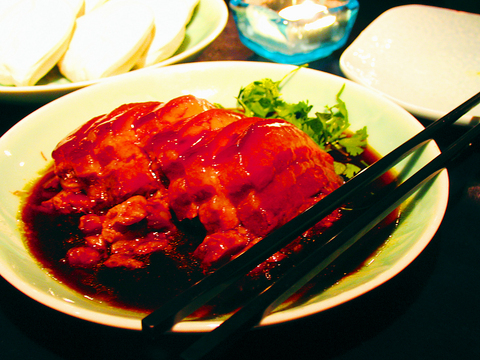If it's any testament to how well Isabelle Wen's fashionable new eatery above Renai Road is doing since its opening a few months ago, there wasn't a seat available at 8pm on Monday. Taipei's own design diva seems to have had no problem making the leap from haute couture to haute cuisine.
But haute cuisine doesn't exactly describe what comes from the kitchen into the chic dining room at Fifi. It's Shanghai and Szechuan cuisine, to be sure, but not like what you've come to expect at similar restaurants around the capital city.
You'll notice the difference from the appetizer page of the menu (NT$180 to NT$280), where stuffed green peppers, green beans with mustard, and bean curd stripped salad vie for your attention, on to Fifi's choices of "vegetables and eggs" (NT$220 to NT$280), as the menu lists them: Hunan double-cooked eggs, "mapao dofu" and other very interesting-sounding items.

PHOTO: DAVID MOMPHARD, TAIPEI TIMES
I chose the pumpkin with salty egg, having decided the "hairy gourd with silver fish" sounded too much like a still life painting. And I was glad that I did; the spice from the pumpkin and saltiness of the egg were nicely equalized by the dofu that found its way into each bite. I'd also ordered the stuffed green pepper, having heard from a source that it was one of the two best appetizers on the menu -- the other being the bean curd stripped salad with garlic, peanut sesame oil, cilantro and white-leaf lettuce. Alas, the stuffed peppers were sold out for the night and the bean curd salad was far more than a single person could put away.
Fifi's, it must be said, is best enjoyed with friends or family. Like so many other local restaurants, portions laid on the table are meant to be divvied up between eight to 10 people, making the ordering of as many items sumptuous but not sinful.
Not sinful until the meat comes to the table, at least. The source who told me about the bean curd salad also turned me onto Fifi's "don po pork" -- the one pictured above -- easily one of the better pork dishes I've had in a city stuffed with delicious pork dishes.
Finally, one of the better reasons to check out Fifi is the third-floor lounge that goes late on weeknights and even later on the weekends. DJ Edmund has just been confirmed as DJ for Wednesday nights.

In the March 9 edition of the Taipei Times a piece by Ninon Godefroy ran with the headine “The quiet, gentle rhythm of Taiwan.” It started with the line “Taiwan is a small, humble place. There is no Eiffel Tower, no pyramids — no singular attraction that draws the world’s attention.” I laughed out loud at that. This was out of no disrespect for the author or the piece, which made some interesting analogies and good points about how both Din Tai Fung’s and Taiwan Semiconductor Manufacturing Co’s (TSMC, 台積電) meticulous attention to detail and quality are not quite up to

April 21 to April 27 Hsieh Er’s (謝娥) political fortunes were rising fast after she got out of jail and joined the Chinese Nationalist Party (KMT) in December 1945. Not only did she hold key positions in various committees, she was elected the only woman on the Taipei City Council and headed to Nanjing in 1946 as the sole Taiwanese female representative to the National Constituent Assembly. With the support of first lady Soong May-ling (宋美齡), she started the Taipei Women’s Association and Taiwan Provincial Women’s Association, where she

Chinese Nationalist Party (KMT) Chairman Eric Chu (朱立倫) hatched a bold plan to charge forward and seize the initiative when he held a protest in front of the Taipei City Prosecutors’ Office. Though risky, because illegal, its success would help tackle at least six problems facing both himself and the KMT. What he did not see coming was Taipei Mayor Chiang Wan-an (將萬安) tripping him up out of the gate. In spite of Chu being the most consequential and successful KMT chairman since the early 2010s — arguably saving the party from financial ruin and restoring its electoral viability —

It is one of the more remarkable facts of Taiwan history that it was never occupied or claimed by any of the numerous kingdoms of southern China — Han or otherwise — that lay just across the water from it. None of their brilliant ministers ever discovered that Taiwan was a “core interest” of the state whose annexation was “inevitable.” As Paul Kua notes in an excellent monograph laying out how the Portuguese gave Taiwan the name “Formosa,” the first Europeans to express an interest in occupying Taiwan were the Spanish. Tonio Andrade in his seminal work, How Taiwan Became Chinese,